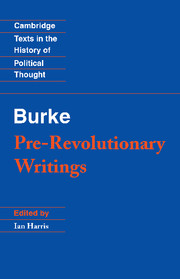Book contents
- Frontmatter
- Contents
- Preface
- Acknowledgements
- Abbreviations
- Chronological table
- Introduction
- A note on the texts
- Biographica
- Bibliography
- ‘Extempore Commonplace on The Sermon of Our Saviour on the Mount’
- A Vindication of Natural Society
- A Philosophical Enquiry into the Origin of our Ideas of the Sublime and Beautiful
- ‘Religion’
- Tracts on the Popery Laws
- Thoughts on the Cause of the Present Discontents
- Conciliation with America
- ‘Almas Ali Khan’
- ‘Speech on the Army Estimates’
- Index of persons
- Index of subjects and places
- Cambridge Texts in the History of Political Thought
Conciliation with America
Published online by Cambridge University Press: 05 June 2012
- Frontmatter
- Contents
- Preface
- Acknowledgements
- Abbreviations
- Chronological table
- Introduction
- A note on the texts
- Biographica
- Bibliography
- ‘Extempore Commonplace on The Sermon of Our Saviour on the Mount’
- A Vindication of Natural Society
- A Philosophical Enquiry into the Origin of our Ideas of the Sublime and Beautiful
- ‘Religion’
- Tracts on the Popery Laws
- Thoughts on the Cause of the Present Discontents
- Conciliation with America
- ‘Almas Ali Khan’
- ‘Speech on the Army Estimates’
- Index of persons
- Index of subjects and places
- Cambridge Texts in the History of Political Thought
Summary
Introduction
‘There is not a more difficult subject for the understanding of men than to govern a large Empire upon a plan of Liberty’, Burke observed early in the debate on America. The reconciliation of empire and liberty was the constant refrain in his speeches. To see that constancy in its proper setting we must understand how he mingled prepossession, principle and practicality. For his speeches provide a reflection at once of Burke's own experience and thought, of the requirements of public consistency and of political convenience.
To discuss the British empire in terms of liberty and subordination was a natural continuation of his interests. It flows not just from the proprietorial regard for liberty so congenial to the Rockinghams and the concern for the liberty of dependent bodies we expect from an Irishman addressing England. There is also Burke's view that obedience to political authority should be given freely. Obedience freely given accorded with the principles of imitation in human nature. It took place where the governors felt they could rely on the governed and so could dispense with coercion. That in its turn would happen when the governed were habituated to civilized behaviour.
These were not Burke's only prepossessions. He also had a congruent view of America itself. There is a parallel with his concern that the England of George III should be governed by an unfettered opinion, for it was that sort of government he had in mind for America: if ‘an Englishman must be subordinate to England’, Burke observed, ‘he must be governed according to the opinion of a free land’.
- Type
- Chapter
- Information
- Pre-Revolutionary Writings , pp. 193 - 269Publisher: Cambridge University PressPrint publication year: 1993



